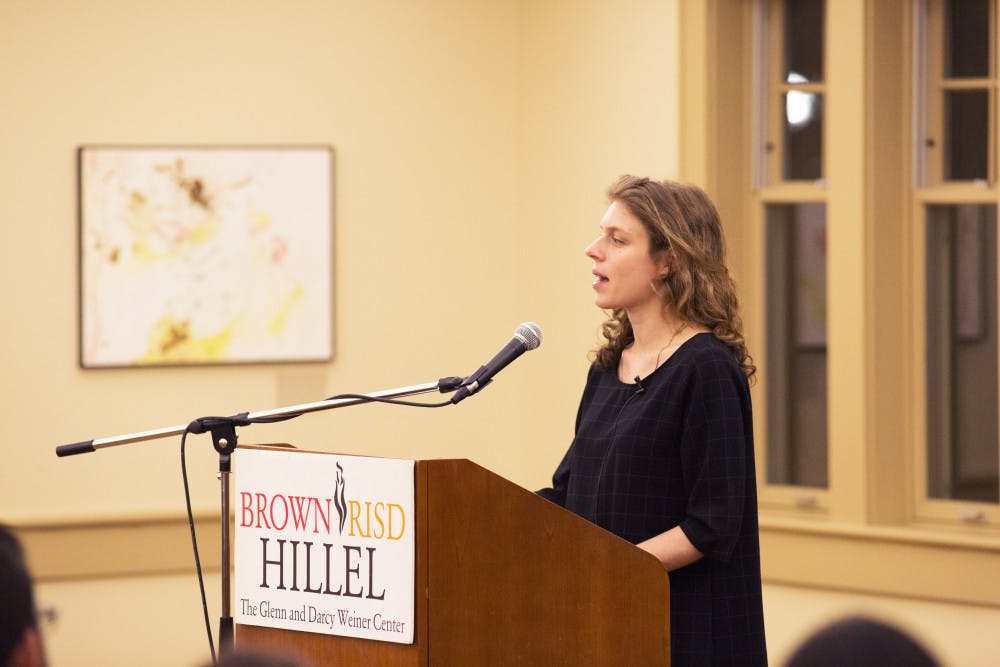Marginalized people such as the homeless, child evangelists and sex offenders have interesting stories to tell, said New Yorker writer Rachel Aviv ’04 at a lecture Wednesday evening. Her talk, which was part of the “Great Brown Nonfiction Writer’s Lecture Series,” surveyed her experiences as a writer as well as the topics she focuses on at the New Yorker.
Aviv opened the lecture with a discussion of the two elements she feels every story must have — what she called the “two strands that intersect.” The first strand includes writing on relevant issues, not trivial matters, she said, stressing the importance of penning stories that resonate with audiences. The second strand involves picking a “character that can act as the through line — someone that gets people to care,” she said. Picking this character is the “difference between writing a story that someone will read and writing a story that they won’t,” she said.
To exemplify this point, Aviv read an excerpt from her New Yorker piece “Netherland,” which focuses on Samantha, a young homeless lesbian woman in New York. By giving the reader an empathetic subject to focus on, Aviv was able to call attention to the larger issue of the city’s policy on homeless youth, she said.
This piece represented what Aviv said she loves about nonfiction: “to get people to identify and relate with people that would otherwise seem too foreign or dangerous.”
She went on to discuss another group often kept at a distance from society: sex offenders. After reading Vladimir Nabokov’s “Lolita,” Aviv found herself feeling compassion for the character Humbert and wondering why society rarely discussed his dilemma in which he “wanted what he could never have.”
After engaging in these musings on Humbert, Aviv ultimately found a protagonist in real life, a sex offender named John, who could “articulate states of mind that otherwise might not get translated into words.” From John’s narrative, Aviv fashioned “The Science of Sex Abuse,” which sheds light on the issue of whether to imprison alleged sex offenders for crimes they have not yet committed.
Aviv said finding the kind of characters who can carry a story is not a scientific process and encouraged writers to “forfeit the ideal of writing (about the) most representative subject” in order to produce a compelling piece.
The “Great Brown Nonfiction Writer’s Lecture Series” was organized by Elizabeth Taylor, co-director of the nonfiction writing program. The series seeks to highlight the various types of writing within the program by bringing writers from all the fields readers would encounter in an average issue of the New Yorker — journalism, lyric essays, science writing, historical narratives, memoirs and cultural critiques, Taylor said.
“We try to find writers from different kinds of backgrounds, as we’re always concerned about trying to get a diverse group of speakers,” Taylor said. The series, which has been offered every other year since 2005, has hosted speakers varying “from nationally known people like Alan Lightman to Brown alums like Susan Cheever ’65 and David Rhode ’90,” she said.
Taylor said she has known Aviv since she was a student in Taylor’s creative nonfiction class, ENGL 1180J: “Tales of the Real World.” “I still remember how extraordinary she was — one of the (students) you recognize immediately is supposed to be a writer,” Taylor said, adding that while she pointed Aviv in the right direction, “you just recognize they just need the space to practice.”
In the 10 years since she walked through the Van Wickle Gates for the final time, Aviv has flourished in her career, becoming a staff writer for the New Yorker and having her writing featured in “The Best American Nonrequired Reading 2010” as well as “The Best American Science Writing 2012.”
Aviv’s appearance was a hit with students. Yamini Mandava ’18 said she enjoyed hearing about Aviv’s “idea of committing yourself to the story more than the writing.”
The talk marked “an exciting sign of maturation” for the nonfiction program, as Aviv was one of the first to write a thesis for the program a decade ago, at a time when the honors program was just coming into creation, Taylor said, adding, “She’s gone on to do everything she’s destined to and we’re so glad she’s able to come back and share her journey.”





